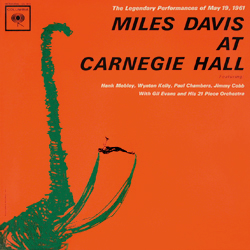With
others | - At the Cafe Bohemia, Vol. 1 (Art Blakey/The Jazz Messengers, 1955)
- At the Cafe Bohemia, Vol. 2 (Art Blakey/The Jazz Messengers, 1955)
- The Jazz Messengers (Art Blakey, 1956)
- Originally (Art Blakey/The Jazz Messengers, 1956 [1982])
- At the Jazz Corner of the World (Art Blakey/The Jazz Messengers, 1959)
- All Night Long (Kenny Burrell, 1956)
- K.B. Blues (1957 [1979])
- Byrd's Eye View (Donald Byrd, 1955)
- Byrd in Flight (Donald Byrd, 1960)
- A New Perspective (1963)
- Mustang! (Donald Byrd, 1966)
- Blackjack (Donald Byrd, 1967)
- Dial "S" for Sonny (Sonny Clark, 1957)
- My Conception (Sonny Clark, 1957)
- Someday My Prince Will Come (Miles Davis, 1961)
- In Person Friday and Saturday Nights
at the Blackhawk, Complete (Miles Davis, 1961) - Miles Davis at Carnegie Hall (1961)
- Afro-Cuban (Kenny Dorham, 1955)
- Whistle Stop (Kenny Dorham, 1961)
- This Is New (Kenny Drew, 1957)
- Undercurrent (Kenny Drew, 1960)
- Farmer's Market (Art Farmer, 1956)
- The Opener (Curtis Fuller, 1957)
- Sliding Easy (Curtis Fuller, 1959)
- Afro (Dizzy Gillespie, 1954)
- Dizzy and Strings (Dizzy Gillespie, 1954)
- Jazz Recital (Dizzy Gillespie, 1954–55)
- I Want to Hold Your Hand (Grant Green, 1965)
- A Blowin' Session (Johnny Griffin, 1957)
- My Point of View (Herbie Hancock, 1963)
- Informal Jazz (Elmo Hope, 1956)
- Goin' Up (Freddie Hubbard, 1960)
- Blue Spirits (Freddie Hubbard, 1965)
- The Eminent Jay Jay Johnson Volume 2 (1955)
- Together! (Elvin Jones and Philly Joe Jones, 1961)
- Midnight Walk (Elvin Jones, 1966)
- I Wanna Talk About You (Tete Montoliu, 1980)
- Introducing Lee Morgan (1956)
- Lee Morgan Sextet (1956)
- Cornbread (Lee Morgan, 1965)
- Charisma (1966)
- The Rajah (1966)
- Tenor Conclave (Prestige All Stars, 1957)
- Star Bright (Dizzy Reece, 1959)
- The Cool Voice of Rita Reys (1956)
- Good Move! (Freddie Roach 1963)
- The Max Roach Quartet featuring Hank Mobley (1953)
- Max Roach + 4 (1956)
- The Max Roach 4 Plays Charlie Parker (1957)
- MAX (Max Roach, 1958)
- Yasmina, a Black Woman (Archie Shepp, 1969)
- Poem for Malcolm (Archie Shepp, 1969)
- Horace Silver and the Jazz Messengers (1954–55)
- Silver's Blue (Horace Silver, 1956)
- 6 Pieces of Silver (Horace Silver, 1956–58)
- The Stylings of Silver (Horace Silver, 1957)
- A Date with Jimmy Smith Volume One (1957)
- A Date with Jimmy Smith Volume Two (1957)
- Julius Watkins Sextet (1955)
|
|---|
